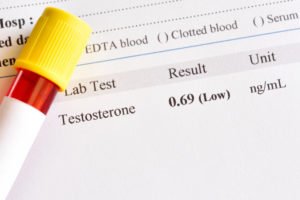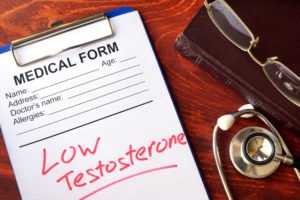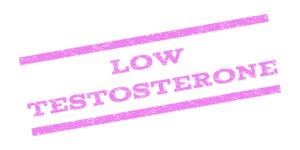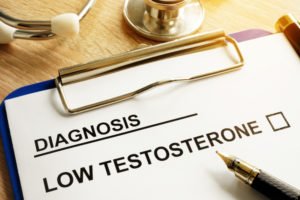
The symptoms of low T can disrupt a man’s life and cause harm to his health and happiness. Treatment is available.
Testosterone as We Age
As men, our journey with testosterone begins in infancy. We begin to produce the hormone only weeks after birth and maintain low levels throughout childhood. When puberty occurs, our levels begin to rise. Higher levels of the hormone help support genital maturity and the production of sperm.
Testosterone levels peak during our late teenage years before leveling out yet again. After we hit age 30, they begin to slowly drop. Unlike women, who go through their change later in life and usually within a shorter timeframe, our change continues throughout the years. It’s often difficult to notice the symptoms at first. After we hit our late 40s to early 50s, the symptoms of low T are usually more pronounced.
The American Urology Association defines “low testosterone” as anything less than 300 nanograms per deciliter.
For a free consultation, call (305) 682-1818
The Common Symptoms of Low T in Men
The body is a complex machine. No system or organ functions on its own. Everything is connected. This allows a disorder like low T to present in a variety of ways.
What are the primary symptoms of low T?
- Reduction of libido
- Fatigue
- Depression
- Loss of muscle mass
- Low volume of semen
- Irritability
- Erectile dysfunction
While these are the most common symptoms of low testosterone, there are often other symptoms that we might not notice at first. This is because most of the secondary symptoms can have a variety of causes. If any of these symptoms are present along with the symptoms listed above, it’s likely that a testosterone imbalance is to blame.
What are some of the subtle symptoms of low T?
- Problems with memory
- Poor focus
- Stumbling over words or struggling with what to say
- Reduced endurance during strenuous activities
Click to contact our specialist today
Testosterone and the Rest of the Body
Whenever we hear low T discussed, it seems as if sex drive, erectile function, and fertility are the most commonly mentioned symptoms. While these issues are a primary concern for most men, it’s important to be aware that low testosterone can affect health in other ways, and some of them are quite serious.
Complete a Free Consultation form now
Circulation and Cardiovascular Health
Testosterone is an important factor in producing red blood cells. Blood vessels and muscle cells have receptors that hold testosterone. Men with low levels can suffer from rigid arteries, but until more research occurs, we won’t be able to provide definitive answers regarding how the hormone affects a man’s risk of heart disease.
We know that men are more likely than women to have a heart attack. We also know that men tend to develop heart disease earlier than women, and that athletes who abuse testosterone injections often end up with health problems. Animal studies showed that supplementing larger amounts of testosterone can lead to cardiac risk factors, such as lowered levels of good cholesterol or low t cells.
That said, it’s already evident that low testosterone can have a negative effect on the heart as well. Men who have the lowest levels of testosterone have the highest levels of cholesterol. It’s possible that many of the symptoms of low T contribute to a higher risk of heart disease. For example, if we become too depressed and lethargic to exercise or eat well, then we will gain weight. If we gain weight, we will lose confidence and possibly suffer from worsening depression. It can become an ugly cycle in which we continue to go downhill.
Studies have found that men who had undergone testosterone replacement therapy didn’t experience any notable change in their cholesterol levels. This suggests that it’s crucial to keep testosterone in a healthy range. Too much is bad, and too little is terrible. For this reason, it’s important to ensure that we always undergo supplementation with the supervision of a professional.
Mental Health
There’s no doubt that healthy testosterone levels play a huge role in a man’s mental health. Just like abnormally high levels of testosterone can cause aggressive behaviors, low T can do the opposite. Biologically speaking, there’s a reason for the connection between testosterone and aggression. Throughout history and across cultures, men have generally performed the most aggressive tasks. This includes duties like fighting in wars, hunting for food, and competing with other males to secure female partners for the purposes of reproduction.
Society is always changing. Being born male doesn’t force us into the same roles it once did, but the biology remains the same. Low testosterone reduces many of the qualities and abilities that make a man feel like a success.
This isn’t to say hormones are the only factor in a man’s mental health. Not all men who have healthy testosterone levels are aggressive or competitive. Likewise, a man with low T could become aggressive for other reasons. However, it’s undoubtable that healthy hormone levels play a key role in keeping a male in a healthy mental state.
Muscle and Bone
Healthy testosterone levels ensure that muscle growth can occur in two ways:
- Increasing neurotransmitters that lead to tissue development
- Increasing levels of growth hormone
Both of the above factors make healthy men more likely to experience muscle growth after a workout session.
Low T can cause damage to the bones as well. There’s a link between lower levels and bone loss, which means men who suffer from the condition are at greater risk of a fracture.
Looking into the Causes of Low T
Although low T in older men is quite common, it’s also possible for younger men to suffer from the condition. The testes are primarily responsible for producing testosterone, but the hypothalamus, pituitary gland, and adrenal glands also play a role. Any problem with these organs can throw off testosterone production.
Similarly, physical damage to the testes or other parts of the body can sometimes cause problems. Men who abuse opiate drugs or suffer from obesity may suffer from low T at a younger age.
All About Low T and Women
Women release small quantities of the hormone through the adrenal glands and ovaries. In females, it’s needed to help to maintain libido and fertility. It’s also important for the formation of new blood cells.
Symptoms of low T in females include:
- Depression
- Low sex drive
- Muscle weakness and lethargy
- Facial hair growth or hair loss
- Acne
A study presented at the 2000 Female Sexual Function Forum in Boston showed that women who complained about a low libido also had lower levels of total and free plasma testosterone.
We can Assist You in Restoring Healthy Testosterone Levels
Are you concerned that you might be suffering from low testosterone? Maybe your sex drive isn’t what it used to be, which is a clear sign something is wrong. Another possibility is having low testosterone but normal libido along with other symptoms of low T. The condition can present itself in different ways and with varying consequences. That’s why it’s so important to talk to the professionals before attempting to treat the condition.
HealthGains is here to help motivated individuals achieve the thriving health they deserve. Our exclusive network includes only the best physicians, many of whom are board certified and recognized within their perspective fields for their expertise.
For more information, please give us a call at (305) 682-1818.
Call or text (305) 682-1818 or complete a Free Consultation Form








